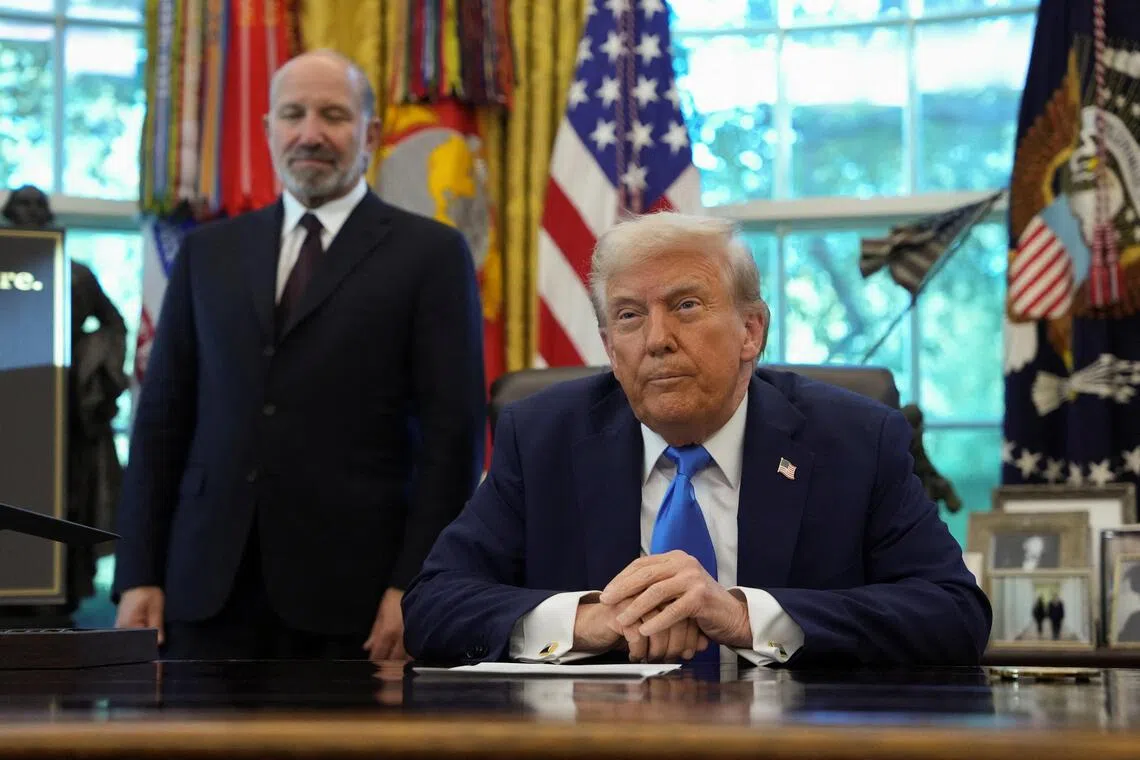Trump to impose $130,000 fee for H-1B worker visas in blow to tech
Sign up now: Get ST's newsletters delivered to your inbox

US President Donald Trump is expected to sign a proclamation as early as Sept 19 restricting entry under the H-1B visa programme unless the application fee is paid.
PHOTO: REUTERS
Follow topic:
- President Trump planned to sign a proclamation restricting H-1B visas and imposing a $100,000 application fee.
- Tech companies like Amazon, Microsoft, and Meta heavily rely on H-1B visas for skilled foreign workers.
- Critics argue H-1B visas suppress wages for American tech workers; India is its biggest recipient.
AI generated
WASHINGTON – US President Donald Trump’s administration said on Sept 19 it would ask companies to pay US$100,000 (S$130,000) a year for H-1B worker visas, prompting some big tech companies to warn visa holders to stay in the US or return quickly.
The change could deal a big blow to the technology sector, which relies heavily on skilled workers from India and China.
Since taking office in January, Mr Trump has kicked off a wide-ranging immigration crackdown, including moves to limit some forms of legal immigration.
The step to reshape the H-1B visa programme represents his administration’s most high-profile effort yet to rework temporary employment visas.
“If you’re going to train somebody, you’re going to train one of the recent graduates from one of the great universities across our land,” said Commerce Secretary Howard Lutnick.
“Train Americans. Stop bringing in people to take our jobs.”
Mr Trump’s threat to crack down on H-1B visas has become a major flashpoint with the tech industry, which contributed millions of dollars to his presidential campaign.
Microsoft, JPMorgan and Amazon responded to the announcement by advising employees holding H-1B visas to remain in the United States, according to internal e-mails reviewed by Reuters.
The companies advised employees on the H-1B visas who were outside the US to return before midnight on Sept 20, when the new fee structure is set to take effect.
“H-1B visa holders who are currently in the US should remain in the US and avoid international travel until the government issues clear travel guidance,” read an e-mail sent to JPMorgan employees by law firm Ogletree Deakins, which handles visa applications for the US investment bank.
Microsoft, JPMorgan, Ogletree Deakins and Amazon did not immediately respond to Reuters requests for comment.
Critics of the H-1B programme, including many US tech workers, argue that it allows firms to suppress wages and sideline Americans who could do the jobs.
Supporters, including Tesla chief executive and former Trump ally Elon Musk, say it brings in highly skilled workers essential to filling talent gaps and keeping firms competitive.
Mr Musk, himself a naturalised US citizen born in South Africa, has held an H-1B visa.
Some employers have exploited the programme to hold down wages, disadvantaging US workers, according to the executive order Mr Trump signed on Sept 19.
The number of foreign science, technology, engineering and mathematics (Stem) workers in the US more than doubled between 2000 and 2019 to nearly 2.5 million, even as overall Stem employment increased by only 44.5 per cent during that time, it said.
Deters global talent
Adding new fees “creates disincentive to attract the world’s smartest talent to the US”, said Mr Deedy Das, partner at venture capital firm Menlo Ventures, on X. “If the US ceases to attract the best talent, it drastically reduces its ability to innovate and grow the economy.”
The move could add millions of dollars in costs for companies, which could hit smaller tech firms and start-ups particularly hard.
Reuters was not immediately able to establish how the fee would be administered. Mr Lutnick said the visa would cost US$100,000 a year for each of the three years of its duration, but the details were “still being considered”.
Under the current system, entering the lottery for the visa requires a small fee and, if approved, subsequent fees could amount to several thousand dollars.
Some analysts suggested the fee may force companies to move some high-value work overseas, hampering America’s position in the high-stakes artificial intelligence race with China.
“In the short term, Washington may collect a windfall; in the long term, the US risks taxing away its innovation edge, trading dynamism for short-sighted protectionism,” said eMarketer analyst Jeremy Goldman.
India accounts for most H-1B visas
India was the largest beneficiary of H-1B visas in 2024, accounting for 71 per cent of approved beneficiaries, while China was a distant second at 11.7 per cent, according to government data.
Amazon and its cloud computing unit AWS had more than 12,000 H-1B visas approved in the first half of 2025, while Microsoft and Meta Platforms had over 5,000 H-1B visa approvals each, according to US Citizenship and Immigration Services.
Mr Lutnick said on Sept 19 that “all the big companies are on board” with US$100,000 a year for H-1B visas.
“We’ve spoken to them,” he said.
Shares of Cognizant Technology Solutions Corp, an information technology services company that relies extensively on H-1B visa holders, fell more than 5 per cent on Sept 19. US-listed shares of Indian tech firms Infosys and Wipro closed between 2 per cent and 5 per cent lower.
Mr Aaron Reichlin-Melnick, policy director of the American Immigration Council, questioned the legality of the new fees. “Congress has only authorised the government to set fees to recover the cost of adjudicating an application,” he said on Bluesky.
The H-1B programme offers 65,000 visas annually to employers bringing in temporary foreign workers in specialised fields, with another 20,000 visas for workers with advanced degrees.
Nearly all the visa fees have to be paid by the employers. The H-1B visas are approved for three to six years.
Mr Trump also signed an executive order on Sept 19 to create a “gold card” for individuals who can afford to pay US$1 million for US permanent residency. REUTERS

